Reduce Utility

What are some effective ways to save on utility costs ?
Saving on utility costs is an essential part of household management. Here are some effective ways to reduce your utility expenses: 1. **Energy-Efficient Appliances**: Replace old appliances with energy-efficient ones and maintain them regularly. 2. **Smart Thermostat**: Install a programmable thermostat and optimize temperature settings for energy savings. 3. **Water Conservation**: Fix leaks and install low-flow showerheads and faucets to save water and money. 4. **Lighting**: Switch to LED bulbs and use natural light during the day to reduce energy consumption. 5. **Insulation and Sealing**: Properly insulate your home and seal gaps and cracks to improve energy efficiency. 6. **Laundry**: Wash clothes in cold water and use a clothesline instead of a dryer to save energy. 7. **Electronics and Devices**: Unplug unused appliances and use power strips to avoid standby power consumption. 8. **Solar Power**: Consider installing solar panels or solar water heaters for long-term energy savings. By adopting these strategies, you can effectively reduce your utility costs and live a more energy-efficient lifestyle.

Are there government programs that assist with reducing utility costs ?
There are several government programs designed to help individuals and families reduce their utility costs, including Low Income Home Energy Assistance Program (LIHEAP), Weatherization Assistance Program (WAP), State and Local Utility Assistance Programs, Energy Efficiency Tax Credits and Rebates, Renewable Energy Incentives, and Community Action Agencies (CAAs). These programs provide financial assistance, energy efficiency improvements, and other resources to make it easier for people to manage their bills.

Is it possible to lower my monthly utility expenses without sacrificing comfort ?
Yes, it is definitely possible to reduce your monthly utility expenses without compromising your comfort. Here are some tips and strategies that you can implement: - **Energy-efficient appliances**: Replace old appliances with energy-efficient models to save on electricity bills. - **Thermostat settings**: Adjust your thermostat settings to save money on heating and cooling. - **Lighting**: Use LED bulbs to use less energy and last longer than traditional incandescent bulbs. - **Water usage**: Fix leaks to save on your water bill. - **Insulation**: Improve insulation to keep your home warm in winter and cool in summer, reducing the need for heating and cooling. - **Unplug electronics**: Unplug electronics when not in use to save on your electricity bill. - **Shop around**: Shop around for better deals on your utilities. - **Be mindful of usage**: Be aware of how much water, gas, and electricity you're using to identify areas where you can cut back.
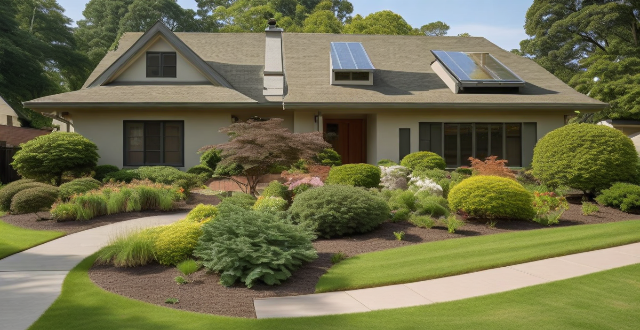
What is the cost of meeting building energy efficiency standards for homeowners and builders ?
Meeting building energy efficiency standards is crucial for reducing energy consumption and promoting sustainability, but it comes with certain costs that both homeowners and builders need to consider. The initial investment includes design and planning fees, high-performance windows and doors, insulation, energy-efficient appliances, skilled tradespeople, and additional time. Ongoing maintenance and operation costs include utility bills, potential tax credits and rebates, regular inspections, repairs, and replacements. Despite the costs, meeting these standards offers benefits such as reduced carbon footprint, improved air quality, health and comfort, lower utility bills, and increased property value.
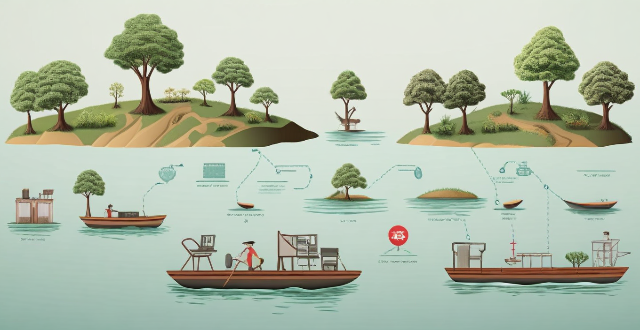
What is the potential of rainwater harvesting as a supplement to traditional water supplies ?
Rainwater harvesting offers environmental, economic, and water security benefits. It reduces runoff and replenishes groundwater. Economically, it saves on utility bills and provides a backup supply. During droughts or emergencies, harvested rainwater is a crucial resource. While generally cleaner than treated municipal water, it may require filtration. Communities can reduce urban heat island effects and raise awareness through rainwater projects. Challenges include legal restrictions and initial costs. Successful implementation requires proper design, maintenance, and pest management.

How do energy-efficient buildings reduce carbon footprint ?
Energy-efficient buildings are crucial for reducing carbon footprint by minimizing energy use and optimizing resources. They incorporate features like proper insulation, air tightness, advanced HVAC systems, renewable energy sources, and smart technology to reduce energy consumption, lower greenhouse gas emissions, and mitigate climate change impact. These structures offer benefits such as lower utility bills, increased comfort, reduced maintenance costs, and higher resale value. Energy-efficient buildings play a significant role in combating climate change and promoting a sustainable future.

Can using a carbon footprint calculator help reduce my environmental impact ?
Using a carbon footprint calculator can help individuals reduce their environmental impact by raising awareness, identifying areas for improvement, setting goals, tracking progress, and encouraging sustainable habits.

How can we reduce our carbon footprint ?
Reducing our carbon footprint is crucial for mitigating the impacts of climate change. Here are some ways we can do so: 1. Use Renewable Energy Sources 2. Conserve Energy at Home 3. Reduce Water Consumption 4. Change Transportation Habits 5. Adopt Sustainable Practices 6. Make Eco-Friendly Choices 7. Educate and Advocate

What are the economic benefits of implementing eco-friendly practices in construction projects ?
Eco-friendly practices in construction projects offer economic benefits such as cost savings, increased property value, improved health and productivity, and risk mitigation. Incorporating energy-efficient designs and materials can reduce utility costs, while the use of durable materials can lower maintenance costs. Tax incentives and grants can offset initial costs, making sustainable practices more affordable. Eco-friendly buildings often have higher resale values and attract tenants and buyers who prioritize sustainability. A healthier indoor environment can reduce absenteeism and healthcare costs for businesses and improve quality of life for residents. Implementing eco-friendly practices can help builders stay compliant with evolving regulations and create resilient buildings that are less vulnerable to climate change impacts.

Can regular physical activity reduce anxiety levels ?
Regular physical activity can help reduce anxiety levels by improving mood, reducing stress hormones, promoting better sleep, increasing self-esteem and confidence, and providing social support. Engaging in at least 30 minutes of moderate-intensity exercise per day can significantly reduce anxiety symptoms.

Can certain foods help reduce inflammation in athletes
Certain foods can help reduce inflammation in athletes. These include anti-inflammatory spices, fruits and vegetables, whole grains, healthy fats, and protein. It's also important to avoid processed foods, sugary drinks, and red meat. By eating a balanced diet full of healthy foods, athletes can reduce inflammation and improve their performance.

How can Smart Grid Technology reduce carbon emissions ?
Smart grid technology can reduce carbon emissions by improving energy efficiency, integrating renewable sources, enhancing system reliability, engaging consumers, and optimizing transmission and distribution.
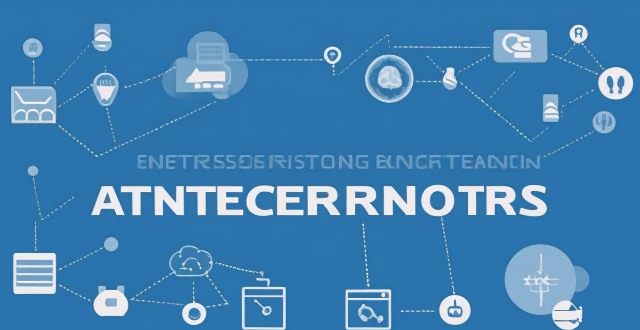
Can upgrading my internet package reduce network latency ?
The text discusses the topic of network latency and whether upgrading an internet package can reduce it. It outlines various factors affecting network latency, including ISP infrastructure, type of connection, location, and network devices. The text then explores different upgrade scenarios, such as moving from DSL to fiber optic or increasing bandwidth, and their potential impact on reducing latency. It concludes that while upgrading can potentially reduce latency, the specifics of each situation should be considered before deciding to upgrade.
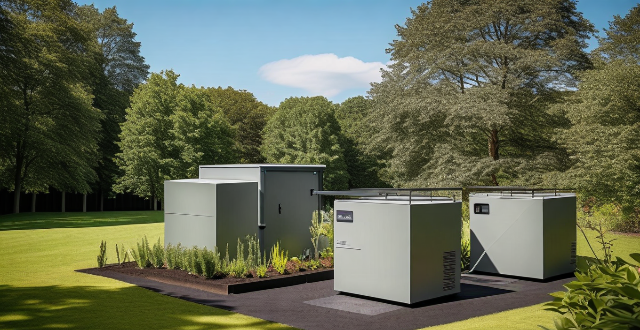
Can Climate-Smart Technologies help reduce global warming ?
Climate-smart technologies, designed to mitigate and adapt to climate change impacts, aim to reduce greenhouse gas emissions, enhance carbon sequestration, and improve resource efficiency. These technologies can help reduce global warming through energy efficiency, renewable energy, and carbon capture and storage. They also aid in adaptation through water management, agricultural innovation, and early warning systems. Co-benefits include resource conservation, economic growth, and health improvements. However, scaling up these technologies, policy support, and equity are challenges that need to be addressed for their successful implementation.

Can music help reduce perceived exertion during exercise ?
Music can help reduce perceived exertion during exercise by positively influencing mood and cognition, and acting as a distraction from bodily symptoms associated with fatigue. Numerous studies have shown the benefits of music on perceived effort levels during workouts, but individual preferences and contextual factors play significant roles. To potentially benefit from reduced perceived exertion, it's important to select music that resonates personally and matches the intensity of your workout.

Can exercise reduce the risk of developing cardiovascular diseases ?
Cardiovascular diseases (CVDs) are a leading cause of death worldwide, and regular physical activity or exercise is one of the most effective ways to reduce the risk of developing them. Exercise helps improve blood circulation, lower cholesterol levels, reduce inflammation, manage weight, and improve glucose control. The American Heart Association recommends at least 150 minutes per week of moderate-intensity aerobic activity or 75 minutes per week of vigorous-intensity aerobic activity, along with muscle-strengthening activities at least two days per week.

How can insurers help promote sustainability and reduce carbon emissions ?
Insurance companies can promote sustainability and reduce carbon emissions by offering sustainable insurance products, encouraging sustainable practices among clients, investing in sustainable projects, and reducing their own carbon footprint.

What are some easy ways to reduce sugar intake in my diet ?
Reducing sugar intake is crucial for a healthy lifestyle. Here are ways to reduce sugar in your diet: read food labels, avoid sugary drinks, choose whole foods, cook at home, swap sweet treats for healthier options, limit added sugars in beverages, and gradually reduce sugar intake. By following these steps, you can significantly lower your sugar consumption and improve your overall health.

How can I reduce the calorie count of my favorite pasta dishes ?
How to reduce the calorie count of your favorite pasta dishes? To reduce the calorie count of your favorite pasta dishes, you can use whole grain pasta, add more vegetables, use low-fat dairy products, reduce the portion size, and use herbs and spices instead of heavy sauces. Whole grain pasta has more fiber than regular pasta, which helps you feel fuller for longer and reduces the number of calories you consume. Adding more vegetables to your pasta dish will not only increase the nutritional value but also help you feel fuller with fewer calories. If your pasta dish includes dairy products like cheese or cream, consider using low-fat versions instead. Reducing the portion size is an obvious but effective way to reduce calorie intake. Using herbs and spices instead of heavy sauces can also reduce the calorie count of your pasta dish. By following these tips, you can enjoy your favorite pasta dishes while maintaining a healthy diet.
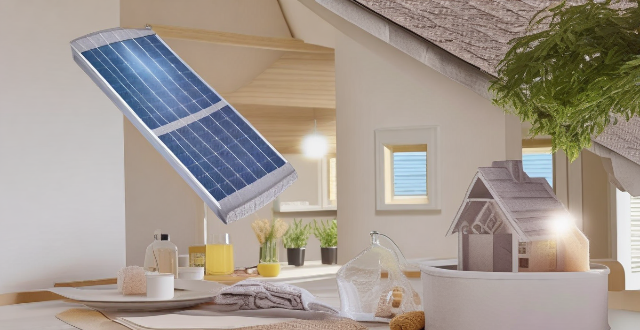
How can we reduce energy consumption in households ?
Reducing energy consumption in households is crucial for saving money and promoting environmental sustainability. Effective methods include switching to energy-efficient appliances, improving insulation, using LED lighting, optimizing heating and cooling, saving water, unplugging electronics, utilizing natural lighting and ventilation, cooking efficiently, and adopting energy-saving habits in laundry and cleaning. Educating family members and monitoring energy usage are also key steps towards reducing a household's energy consumption.

How do climate-friendly products help reduce carbon emissions ?
Climate-friendly products contribute to reducing carbon emissions by promoting sustainable practices. They achieve this through energy efficiency, use of renewable materials, durability, reduced transportation impact, and environmentally conscious packaging. These products help in conserving resources, minimizing waste, and lowering pollution levels, ultimately aiding in the fight against climate change.

How can we reduce our exposure to harmful chemicals in everyday life ?
In today's world, it is nearly impossible to entirely avoid exposure to harmful chemicals. However, there are several steps we can take to significantly reduce this exposure and protect our health. Here are some practical tips: - Choose natural products for food, beverages, personal care, and cleaning agents. - Avoid plastic by using glass or stainless steel water bottles, storing food in glass containers, and opting for reusable alternatives for straws and cutlery. - Create a healthier home environment by choosing furniture made from natural materials, maintaining good air quality, and selecting natural fabrics for clothing and decor. - Wear clothing made from organic cotton or other sustainable materials, be mindful of dyes and finishes used in clothing, and use natural or eco-friendly detergents for washing clothes. - Choose non-toxic cookware and BPA-free plastic containers for food storage. - Limit the use of electronic devices that may emit EMFs, especially before bedtime, and consider wired headphones over wireless ones to reduce exposure to Bluetooth radiation.

How can multicultural education help reduce racial and ethnic discrimination ?
Multicultural education is crucial in combating racial and ethnic discrimination. It fosters cultural awareness, intercultural competence, challenges biases, promotes social justice, builds inclusive communities, and prepares global citizens. By doing so, it helps reduce discrimination and creates a more equitable and harmonious society.

Are there any energy-saving tips for households ?
Energy conservation is essential for reducing environmental impact and utility bills. Here are some energy-saving tips for households: using energy-efficient light bulbs, maximizing natural light, setting thermostats to comfortable temperatures, using ceiling fans instead of air conditioning, sealing windows and doors, insulating the home, unplugging electronics when not in use, washing clothes in cold water, choosing energy-efficient appliances, lowering water heater temperature settings, insulating water heaters and pipes, fixing leaky faucets and showerheads, turning off electronic devices when not in use, using power management features on computers, and avoiding leaving devices on standby mode overnight. By implementing these tips, households can reduce their energy consumption and save money while contributing to a healthier environment.

Can I save money on utilities by making small adjustments to my habits ?
Saving money on utilities can be achieved by making small adjustments to daily habits. Here are some tips: - Turn off lights and unplug electronics when not in use, and use energy-efficient bulbs. - Lower your thermostat by 2-3 degrees in winter and raise it in summer, install a programmable thermostat, and use ceiling fans. - Fix leaky faucets, take shorter showers, and consider low-flow fixtures. - Wash clothes in cold water, only run full loads in the dishwasher and laundry machine, and air-dry clothes. - Cook small meals in a microwave or toaster oven, keep the fridge organized, and let food cool before refrigerating. By adopting these practices, you can significantly reduce your utility bills.

What are the economic implications of adopting Smart Grid Technology ?
Adopting Smart Grid Technology brings about several economic implications that can be beneficial for both consumers and utility companies. These implications include cost savings, increased reliability, job creation, improved energy efficiency, and investment opportunities.

How can I make my home more energy-efficient ?
Making your home more energy-efficient can reduce your carbon footprint, save money on utility bills, and improve the comfort of your living space. To achieve this, consider proper insulation, improving window and door performance, optimizing heating and cooling systems, using energy-efficient appliances and electronics, and switching to energy-efficient lighting options. By implementing these strategies, you can enjoy the benefits of a more sustainable future.
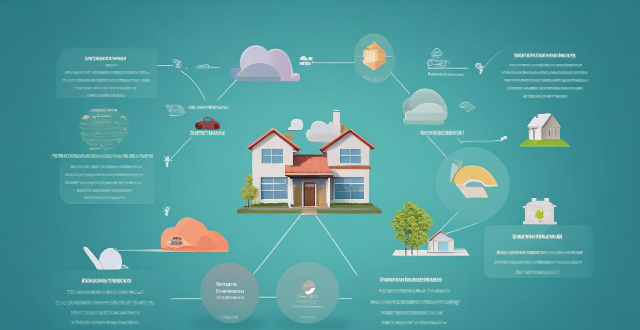
How can I install a distributed energy system in my home or business ?
Installing a Distributed Energy System (DES) in your home or business can significantly reduce reliance on the grid and provide financial savings. The process involves assessing energy needs, site evaluation, financial analysis, system design, permitting, installation, and maintenance. Choosing the right technology, sizing the system appropriately, and selecting quality equipment with certified installers are crucial steps. Permitting includes checking local regulations and coordinating with the utility for interconnection. Installation involves mounting equipment, electrical connections, and system checks. Maintenance ensures optimal performance through cleaning, inspections, and performance tracking. This investment requires careful planning but offers substantial rewards.

Can energy-efficient lighting systems be used in commercial buildings as well as residential homes ?
Energy-efficient lighting systems offer significant energy savings, reduced maintenance costs, and environmental benefits. LED, CFL, and halogen lighting are common types of energy-efficient lighting systems that can be used in both commercial buildings and residential homes. By choosing an energy-efficient lighting system, users can contribute to a more sustainable future while also saving money on utility bills.
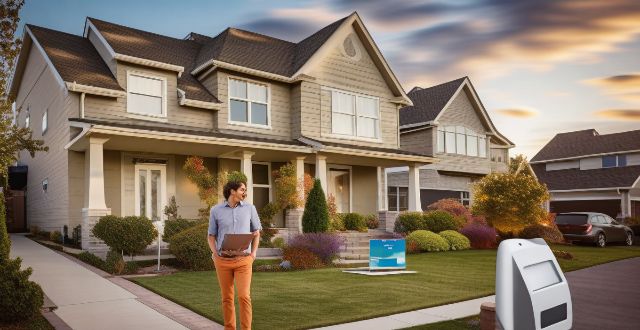
How do smart living gadgets contribute to energy efficiency in homes ?
Smart living gadgets play a significant role in enhancing energy efficiency in homes. They automate and optimize household operations, resulting in reduced energy consumption and lower utility bills. Smart thermostats allow remote control of heating and cooling systems, while smart light bulbs can be controlled remotely and set to turn on/off automatically. Smart plugs and power strips monitor and control power consumption of appliances, reducing standby power waste. Smart water heaters optimize hot water production based on demand, reducing unnecessary energy consumption. Adopting these devices can help homeowners reduce energy consumption, lower utility bills, and contribute to a more sustainable future.